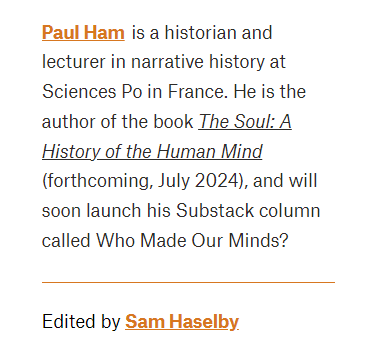Welcome to DU!
The truly grassroots left-of-center political community where regular people, not algorithms, drive the discussions and set the standards.
Join the community:
Create a free account
Support DU (and get rid of ads!):
Become a Star Member
Latest Breaking News
General Discussion
The DU Lounge
All Forums
Issue Forums
Culture Forums
Alliance Forums
Region Forums
Support Forums
Help & Search
General Discussion
Related: Editorials & Other Articles, Issue Forums, Alliance Forums, Region ForumsCensoring offensive language threatens our freedom to think

The modern obsession with textual purity stems from a misapplication of the philosophies of Wittgenstein and Derrida
https://psyche.co/ideas/censoring-offensive-language-threatens-our-freedom-to-think

Graffiti on the wall of the Odéon theatre in Paris, France; 23 May 1968. Photo by Guy Le Querrec/Magnum

‘The Karen buried her hatchet and submitted to the straight, fat hillbilly’s rule of thumb that gay ladies and gentlemen of colour should be blackballed from the powwow.’ This sentence offends almost everyone, according to the inclusive language guidelines being drawn up by universities, corporations and public bodies in the Western world. Their guidelines would have struck a red line through every word. What I should have written was: ‘The entitled white woman, in the interests of peace, accepted the default ruling of the obese, heterosexual person from the Ozarks that LGBTQ+ and BIPOC should not be invited to the get-together.’ Obviously, this is meant satirically. No writer worth his or her (or their) salt would write such a sentence (for aesthetic reasons, hopefully, and not because it offends).
But the fact that I feel the need to explain myself at all suggests the presence of an intimidating new force in society, a kind of thought virus that has infected most organisations and political parties, on the Right and Left, the key symptom of which is an obsession with textual ‘purity’, that is, language stripped of words and phrases they deem offensive. Yet, in trying to create a language that offends no one, they offend almost everyone. Why are we so afraid to use words freely, to offend with impunity? Whence arose this fetish for the ‘purity’ of the text? I trace the origins of this obsession with textual purity to the triumph of linguistic philosophy in the early 20th century. Let’s alight on a few key moments in that story to understand how we got here.
Richard Rorty, the editor of the seminal anthology The Linguistic Turn: Essays in Philosophical Method (1992), described ‘linguistic philosophy’ as ‘the view that philosophical problems are problems which may be solved (or dissolved) either by reforming language, or by understanding more about the language we presently use’. The elevation of language to such dizzy eminence divided philosophers: some thought it the greatest insight of all time; others were disgusted by what they interpreted as ‘a sign of the sickness of our souls, a revolt against reason itself’. The ‘linguistic turn’ on which the new thinking hinged was a radical reappraisal of the very purpose of philosophy. It swung away from the grand philosophical systems of the 18th and 19th centuries (as adumbrated by G W F Hegel, Immanuel Kant, Arthur Schopenhauer and lesser lights), and divided into two streams of thought – ‘analytic’ and ‘continental’ philosophy – which disputed much but shared this: an obsession with language and the limits of meaningful language.
The thinker who did most to propel philosophy into the orbit of linguistics was an Austrian logician and star pupil of Bertrand Russell’s called Ludwig Wittgenstein (1889-1951). He blamed what he saw as the confusion in philosophy on ‘the misunderstanding of the logic of our language’, as he recounted in the first of his two philosophical works, Tractatus Logico-Philosophicus (1921). The ‘whole meaning’ of this book, explained Wittgenstein, was to define the limits of meaningful language and, by extension, meaningful thought: ‘What can be said at all can be said clearly; and whereof one cannot speak thereof one must be silent. The book will, therefore, draw a limit to thinking, or rather – not to thinking, but to the expression of thoughts.’ In a letter to Russell, he was more specific: language, he wrote, was the same as thought: ‘The main point [of the Tractatus] is the theory of what can be expressed … by language – (and, which comes to the same, what can be thought).’
snip
InfoView thread info, including edit history
TrashPut this thread in your Trash Can (My DU » Trash Can)
BookmarkAdd this thread to your Bookmarks (My DU » Bookmarks)
0 replies, 276 views
ShareGet links to this post and/or share on social media
AlertAlert this post for a rule violation
PowersThere are no powers you can use on this post
EditCannot edit other people's posts
ReplyReply to this post
EditCannot edit other people's posts
Rec (1)
ReplyReply to this post